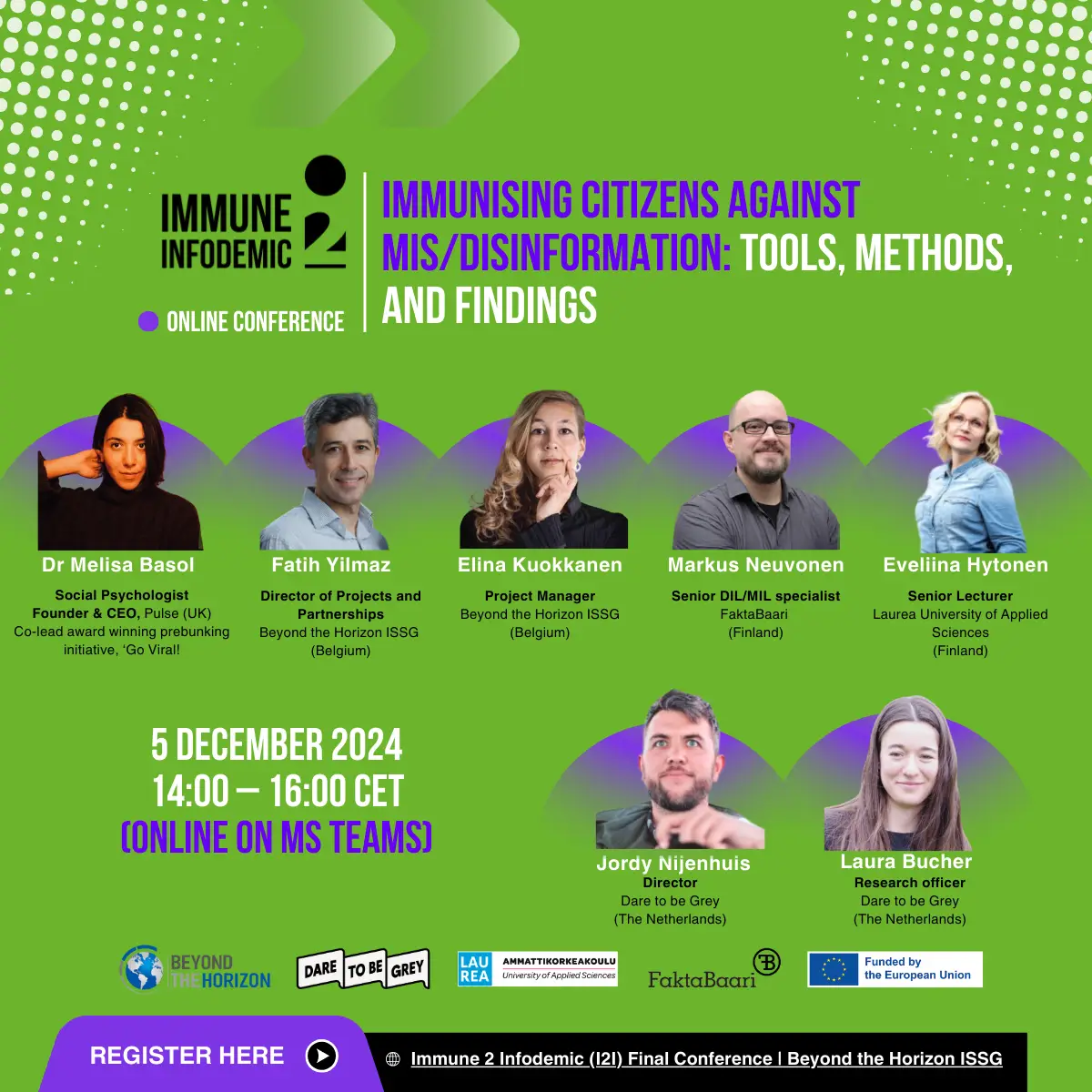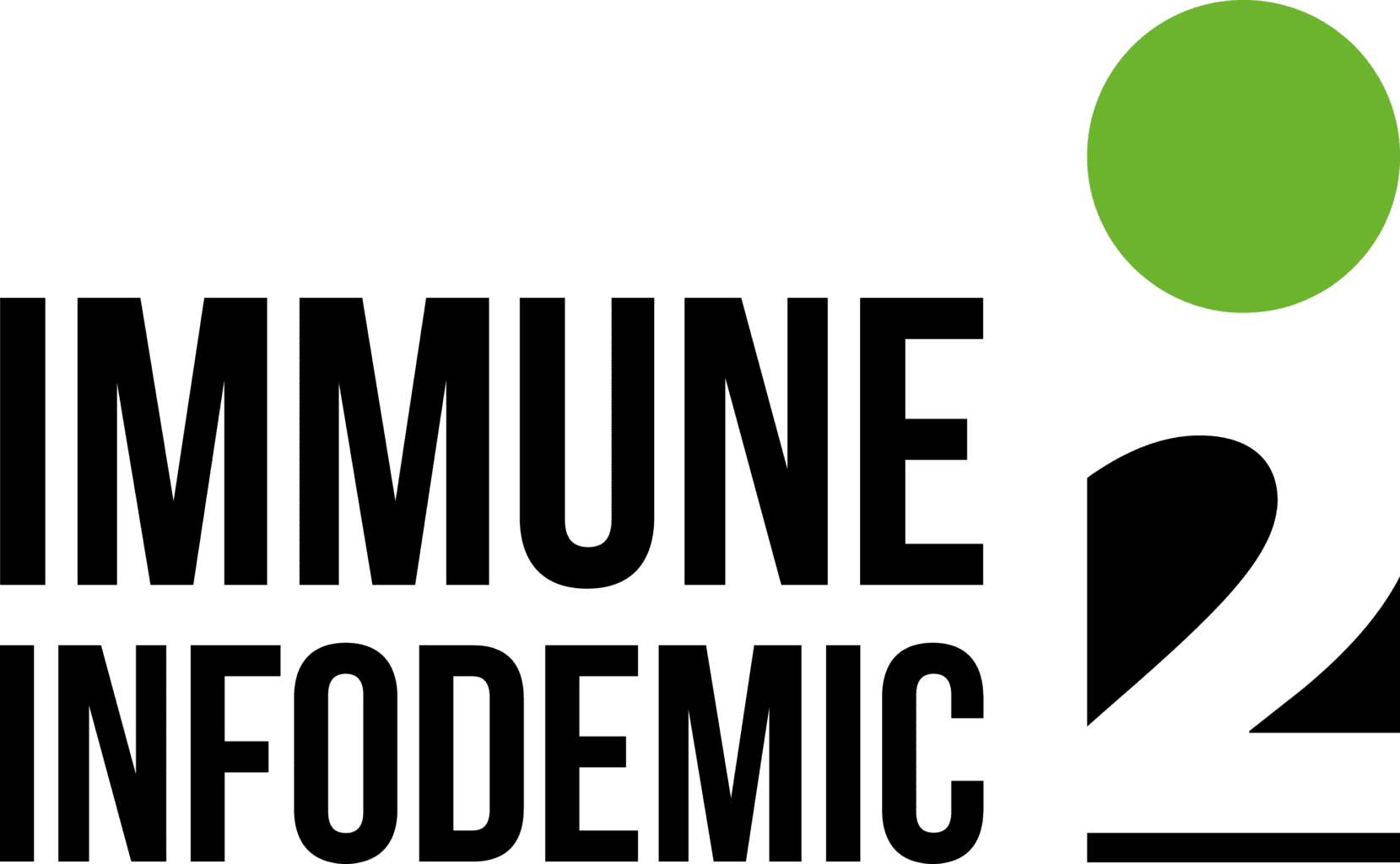Immune 2 Infodemic (I2I) Final Conference
Immunising citizens against mis/disinformation: Tools, Methods, and Findings
Inoculation (vaccination) against misinformation is not a new concept, but it has gained renewed attention thanks to recent work by Sander van der Linden, Melisa Basol and their team at Cambridge University, who have been actively applying and researching this theory. They used gamification as a tool for vaccination people against mis/disinformation, and the results were promising.
I2I project aimed to vaccinate people with a similar goal for increasing their resilience or immunising them against spreading mis/disinformation viruses on selected topics: migration, elections and health.
I2I developed easy-to-use tools for the general public including youth, elderly and the most vulnerable using social media. These tools include Critical Thinking (CT), Media & Information Literacy (MIL) and Digital Information Literacy (DIL).
The vaccinations were implemented through online and in-person events, workshops and also a recently launched e-learning that could be freely used by all citizens who want to immunize themselves.
This conference aimed to share the I2I methodology and its findings and experiences with the target groups. Practitioners, decision/policy makers, educators and all interested citizens could register and join our webinar conference.
Speakers

Schedule
05 December 2024 (14:00 – 16:00 CET) (Online on MS Teams)
14:00-Welcome and Introduction
Elina Kuokkanen, Beyond the Horizon ISSG (Belgium)
14:05-Keynote Speech
“Building psychological resilience against misinformation”
Dr Melisa Basol, Social Psychologist, Founder & CEO of Pulse
Co-lead award winning prebunking initiative, ‘Go Viral!
14:20-I2I vaccination methodology
Fatih Yilmaz, Beyond the Horizon ISSG (Belgium)
14:35-I2I tools (DIL – MIL – CT) for resilience
Markus Neuvonen, FaktaBaari (Finland)
14:55-A short-demo of E-learning
Fatih Yilmaz – Elina Kuokkanen, Beyond the Horizon ISSG (Belgium)
15:15-Panel discussion: Vaccination Implementation Insights from 3 EU countries
Moderator Elina Kuokkanen, Beyond the Horizon ISSG (Belgium)
- Markus Neuvonen, FaktaBaari (Finland)
- Laura Bucher – Jordy Nijenhuis, Dare to be Grey (The Netherlands)
- Eveliina Hytonen, Laurea University of Applied Sciences (Finland)
- Fatih Yilmaz – Beyond the Horizon ISSG (Belgium)
15:50-Closing Remarks and Next Steps
Elina Kuokkanen, Beyond the Horizon ISSG (Belgium)
16:00-End
summary
Since the beginning of 2022, Immune to Infodemic has worked to empower EU citizens in the Netherlands, Finland, and across Europe with tools to counter misinformation. Over two years, it introduced innovative methods and engaged audiences through dynamic events. This webinar presented the project’s journey, methodology, and insights with practitioners, decision/policy makers, educators and all interested persons.
The inoculation against mis/disinformation
The Inoculation against mis/disinformation, inspired by vaccination, aims to build resistance by raising awareness of vulnerabilities and teaching people to recognize manipulative tactics. Tools like the “Go Viral” game exposed users to misinformation strategies, helping them develop long-lasting defenses. Studies confirmed that this approach reduces trust in false information and strengthens critical thinking for weeks or even months. Addressing misinformation requires more than one solution—media literacy, transparency, and collaboration are all key. Expanding proven methods like inoculation can help societies resist its spread.
Immune2Infodemic Vaccination Methodology
The Immune to Infodemic project set out to tackle the spread of disinformation, particularly around migration, elections, and health. Its goal was to immunize EU citizens, especially in Belgium, Finland, and the Netherlands, by providing easy-to-use tools that empower people to make informed decisions. The project focused on vulnerable groups, including youth, seniors, and migrants, while also engaging professionals and influencers to amplify the message.
Through its methodology, the project introduced a series of “vaccines” designed to build critical thinking, media literacy, and digital literacy. These tools helped individuals evaluate and correct their thinking, assess the reliability of information, and understand digital footprints, privacy, and algorithms. To counter false narratives, the project also offered specific boosters targeting topics like migration, health, and elections.
Main injection methodology was actively engaging with the target group during a variety of events, workshops, student interactions, campaign and multiplier events, hackathons, etc. The injections happened in 3 steps:
- Giving a weakened dose of mis/disinformation
- Giving the tools
- Applying the tools on cases
Over the course of the project, the team developed and tested 31 tools, which were distributed through workshops and online events. The outreach included 20 series of events targeting around 2,000 participants, with an estimated 20,000 online views. In total, over 45 events were held across Belgium, Finland, and the Netherlands, reaching more than 1,800 people so far and generating over 45,000 online engagements in 32 countries.
The Immune to Infodemic project ultimately aimed to equip a broad audience across Europe with the necessary skills to spot and challenge misinformation, contributing to a more informed and resilient society.
Tools for resilience: critical thinking, digital information literacy and media & information literacy
The I2I project focuses on equipping individuals with tools that enhance metacognition—thinking about thinking—to help them better evaluate information in various contexts. These tools aim to improve critical thinking and media literacy, making them adaptable to different situations. However, learning these skills can be challenging, as people often struggle to apply them outside their specific domains, like scientific reasoning. To address this, the tools are designed to be intuitive, practical, and progressive, helping users build resilience step by step. While these tools, like the Socratic Questioning, Argument Mapping, Media Diaries, and Lateral Reading, are effective, they require active engagement and can’t solve the problem of misinformation on their own. The complexity of the digital landscape makes it difficult to apply simple rules universally. Nevertheless, when practiced deliberately, these tools have proven to strengthen individuals’ ability to resist disinformation in areas like politics, social media, and privacy settings.
I2I E-learning
E-learning has also been developed by I2I project that is free and accessible for all citizens. The e-learning includes 6 modules covering 3 vaccines and 3 boosters. It starts with a dystopian futuristic scenario for 2035 showing that if the infodemic is not resisted, we can be living in a non- or weakened democracy threatened by many different challenges and actors. These actors are represented by villain characters, while our training guides are represented by 3 hero characters in the e-learning. This makes E-learning more attractive for the target groups, especially for the youth. The tools are presented and applied in different cases in the e-learning.
Vaccination Implementation Insights from 3 EU countries
The discussion covered strategies for organizing events and engaging diverse groups. Students at Laurea University gained practical event management experience, connecting with networks like schools and the naval forces, despite challenges in scheduling. Civil society networks were exploited to reach students in psychology and international relations, who applied workshop tools on social media. A significant impact was made at the Educa Fair, engaging 800 teachers on topics like information literacy and AI. Collaborations in Belgium with municipalities aimed to reach students, first-time voters, and language teachers, though engaging seniors remains a challenge.
Workshops had a strong impact, particularly with safety and security students, who became more aware of misinformation’s workplace effects. Challenges included addressing biases and fostering intellectual humility.
Looking ahead, tools are being tested with youth and workshops planned for seniors, with materials available both online and in print. Youth are eager to act against disinformation, offering hope for change.
Next steps
The second phase of the infodemic project has begun, now involving partners from the Netherlands, Finland, and Germany. This phase focuses on developing new tools and expanding boosters to address additional topics. Key challenges include the growing threat of AI-driven disinformation, increasing distrust in public institutions, rising extremism, and the digital skills gap, particularly among young people. To address these issues, three new boosters will be created: AI-enabled disinformation, foreign information manipulation and interference (FIMI), and environmental and climate change misinformation. The project will move into the injection phase with online events and workshops planned for March or April.



